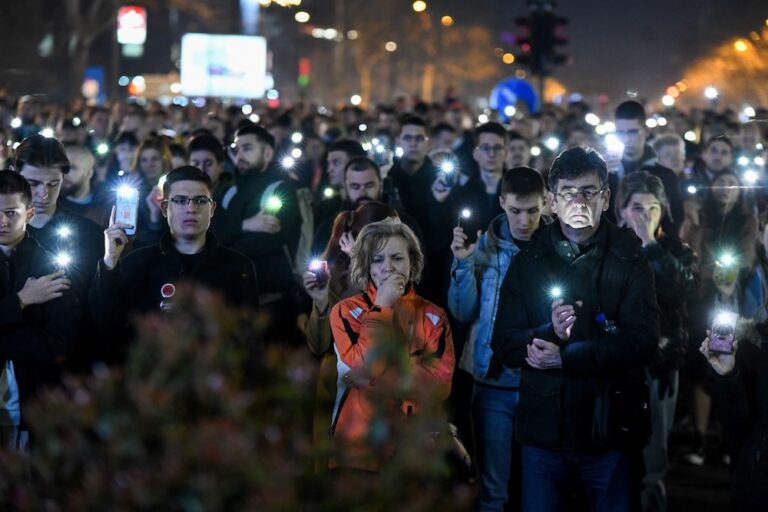(ARTICLE 19/IFEX) – The following is a 1 March 2005 letter to Prime Minister Ramush Haradinaj: Prime Minister Ramush Haradinaj 1st March 2005 Dear Prime Minister, ARTICLE 19, the Association of Professional Journalists of Kosovo (AGPK) and the NGO Advocacy, Training and Resource Centre (ATRC), are writing in relation to the Provisional Criminal Code of […]
(ARTICLE 19/IFEX) – The following is a 1 March 2005 letter to Prime Minister Ramush Haradinaj:
Prime Minister Ramush Haradinaj
1st March 2005
Dear Prime Minister,
ARTICLE 19, the Association of Professional Journalists of Kosovo (AGPK) and the NGO Advocacy, Training and Resource Centre (ATRC), are writing in relation to the Provisional Criminal Code of Kosovo. We understand that negotiations about the future status of Kosovo will begin in mid 2005 and that the outcome depends, among other things, on whether Kosovo has satisfied human rights standards set by the international community. We urge you to take this opportunity to address the issue of Kosovo’s criminal defamation provisions which breach international standards of freedom of expression.
ARTICLE 19 first addressed the need for reform of Kosovo’s defamation provisions in November 2002, in a letter to Mr. Jean-Christian Cady, the UNMIK Deputy Special Representative for Police and Justice. In that letter, drawing attention to the fact that no one had been imprisoned for defamation in established democracies for several years, we urged the international authorities to remove criminal insult and libel from the then draft Criminal Code and replace them with appropriate civil law provisions.
Regrettably, penal sanctions of up to three months’ imprisonment for insult (Article 187) and for libel (Article 188) are currently in force under the Provisional Criminal Code. A recent judgment in a defamation case prosecuted under the former Criminal Code (which provided for even higher sentences), demonstrates the readiness of the Kosovar courts to impose harsh penalties. Nyrset Shasivari, correspondent with Bota Sot, was recently found guilty of libeling the local Human Rights Defence Council in Prizren and was sentenced to a six month suspended prison term.
Such sanctions are not in line with the proportionality requirement established by the European Court of Human Rights. Unduly harsh penalties, such as prison sentences or high fines have been judged by the Court to represent a breach of the right to freedom of expression even if the circumstances justify some sanction for abuse of the right to reputation.[1] Consequently, countries, such as Romania and Montenegro have removed prison sanctions from their legislation, we hope as a first step towards complete decriminalization.
In calling for the complete abolition of criminal defamation provisions, ARTICLE 19 is supported by the three international mandates set up to defend and promote the fundamental right to freedom of expression. The OSCE Representative on Freedom of the Media, the UN Special Rapporteur on Freedom of Opinion and Expression and the OAS Special Rapporteur on Freedom of Expression have stated on a number of occasions that criminal defamation provisions are not a justifiable restriction on freedom of expression.[2]
In particular, the OSCE Representative on Freedom of the Media has appealed to all European countries to repeal their criminal defamation and insult laws and most recently urged the Polish authorities to put in force a moratorium on the use of restrictive laws, pending reform of their Criminal Code.[3]
As Kosovo is embarking on reform in a number of areas in advance of possible status talks, we believe that the time is right to revisit the balance which should be set between the right to freedom of expression and the right to reputation. As a number of countries have found, this balance is best achieved through the use of civil law remedies, rather than criminal sanctions. For instance, Ukraine and Georgia have completely decriminalized defamation. Furthermore, a precedent has been set in this region by the international community which, in 2001, supported the abolition of criminal defamation provisions in Bosnia and their replacement with a civil defamation law. We see no reason why the same standard should not be applied in Kosovo.
We sincerely hope that you will consider initiating reform in this vital area of freedom of expression and we remain available to assist in any way we can.
Yours sincerely,
Dr. Agnès Callamard
Executive Director, ARTICLE 19
Naser Miftari
Chairman, Association of Professional Journalists, Kosovo
Kreshnik Berisha
Director, Advocacy, Training and Resource Centre
Copied to:
Mr. Islam Sllamniku, Head of Legal Office of the Prime Minister
Mr. Søren Jessen-Petersen, Special Representative of the UN Secretary General
OSCE Mission to Kosovo
[1] See for example, Lingens v. Austria, 8 July 1986, Application No. 9815/82 (European Court of Human Rights), at para. 44
[2] See for example, the Joint Declaration by the UN Special Rapporteur on Freedom of Opinion and Expression, the OSCE Representative on Freedom of the Media and the OAS Special Rapporteur on Freedom of Expression, London, December 2002.
[3] See OSCE Press Release, 25 January 2005, at: http://www.osce.org/news/show_news.php?id=4666


